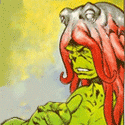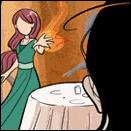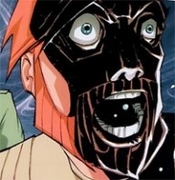|
Pearls of Lutra had a cool cover.
|
|
|
|

|
| # ? May 10, 2024 00:51 |
|
The non-white evil humans in Tolkien get memorialized with speeches regarding how they were tricked, lied to, or forced into fighting the forces of good. Orcs on the other hand don't, as they had the excuse of their whole society literally being run by Satan.
|
|
|
|
If you haven't already pledged your life in service of Morgoth than I have nothing to say to you. #SilmarilsAreForever
|
|
|
|
Since Redwall has been brought up again, it is mandatory that someone posts this.
|
|
|
|
Oh man in Zelda 2 if you get a game over in the Grand Palace they let you start over at beginning of the palace!  edit: beat the Thunderbird probably the first time in my life. He's actually pretty easy. I've beat Shadow Link without cheating before though. Sephiroth_IRA fucked around with this message at 23:43 on Feb 22, 2015 |
|
|
|
DStecks posted:You can argue that Tetris isn't a game, but a puzzle, but saying it's not a video game is just bizarre. CWC's musical output was one of the funniest things when I was teen. I never paid much attention to Sonichu, but bad singers are hilarious. Plus, CWC and I sing alike!  If possible, can you also make a video on the CWC community? If possible, can you also make a video on the CWC community?
|
|
|
|
PresidentBeard posted:The non-white evil humans in Tolkien get memorialized with speeches regarding how they were tricked, lied to, or forced into fighting the forces of good. Orcs on the other hand don't, as they had the excuse of their whole society literally being run by Satan. Pretty much, everyone who's an actual 'race' is being hosed over by Satan, the Orcs are literal evil creations of evil magics. This plus the 'it was the loving fifties' always made the 'yea but Lord of the Rings is problematic too' stuff feel hollow. Meanwhile Redwall has fully sentient races who are just inherently evil because wink wink nudge nudge you know how some types are right, and was written in the modern rear end age. Dude knew what was up.
|
|
|
|
INH5 posted:FEAR 2. Though I haven't played the game myself, so I don't know how it actually handles it. Does this mean that Jehovah exists in Lord of the Rings World? That seems even worse, theologically speaking, than just making it a heathen Viking world.
|
|
|
|
Jack Gladney posted:Does this mean that Jehovah exists in Lord of the Rings World? That seems even worse, theologically speaking, than just making it a heathen Viking world. Middle Earth has a bizarrely complicated monotheistic cosmic order to go along with its understandably complicated anthropology and linguistics. It closely mirrors Christianity with a few curveballs. His religion had a pretty big effect on his work, as was such with his BFF C.S. Lewis. CGP Grey explains Tolkien's mythology better than I could: https://www.youtube.com/watch?v=YxgsxaFWWHQ https://www.youtube.com/watch?v=WKU0qDpu3AM
|
|
|
|
Man, it never occurred to me how messed up the Redwall series was. I enjoyed them as a kid, but my actual problem with the series was that the plot of every book was basically the goddamn same thing. I stayed for the made up recipes.
|
|
|
|
Jack Gladney posted:Does this mean that Jehovah exists in Lord of the Rings World? That seems even worse, theologically speaking, than just making it a heathen Viking world. Illuvatar is pretty similar to Jehovah, except he made all of creation through a song instead of simply speaking it into existence. Because he's got way more pizazz than dull old Jehovah.
|
|
|
|
It seems like the way you're supposed to beat shadow link is to try and advance on him during a duel. The way I usually do it always felt a little too gamey (jump downthrust/swipe repeat) and not in the spirit of what the designers wanted.
Sephiroth_IRA fucked around with this message at 00:11 on Feb 23, 2015 |
|
|
|
Sephiroth_IRA posted:It seems like the way you're supposed to beat shadow link is to try and advance on him during a duel. The way I usually do it always felt a little too gamey (jump downthrust/swipe repeat) and not in the spirit of what the designers wanted. Shadow Link in pratice always seemed like the easiest boss to cheap out. In OOT all you have to do is spam Din's Fire or the Megaton Hammer.
|
|
|
|
Sephiroth_IRA posted:Pearls of Lutra had a cool cover. As I recall it, Pearls of Lutra is one of two books which had a "good" vermin character (Romsca, the guard captain, who helps the heroes and dies at the end). I was mad keen on the Redwall series when I was a kid, before the Edge Chronicles became my juvenile fantasy series of choice. Darth Walrus posted:Since Redwall has been brought up again, it is mandatory that someone posts this. Haha, first thing I ever read on SA and still probably my favourite.
|
|
|
|
BigRed0427 posted:Shadow Link in pratice always seemed like the easiest boss to cheap out. In OOT all you have to do is spam Din's Fire or the Megaton Hammer. I think there was actually some intent in Zelda 2 to make it into an epic duel but by the time most people got to the guy their health/lives/magic were so low I wouldn't be surprised if someone just instinctively ran to a corner, squatted and mashed the B button. Was there a way to beat OOT Shadow Link with the sword? I've only played through that game once and I'm sure I used the hammer on him.
|
|
|
|
Wheat Loaf posted:As I recall it, Pearls of Lutra is one of two books which had a "good" vermin character (Romsca, the guard captain, who helps the heroes and dies at the end). I was mad keen on the Redwall series when I was a kid, before the Edge Chronicles became my juvenile fantasy series of choice. Man, the Edge Chronicles really lose a lot of their charm when read as a series. Basically, every triumphant note and happy ending in any given book is immediately overruled by its sequel, to the point where it outright saps your investment. C'mon, dude, let the good things last sometimes. Make your characters' triumphs meaningful. It's not like it'll kill you.
|
|
|
|
Sephiroth_IRA posted:I think there was actually some intent in Zelda 2 to make it into an epic duel but by the time most people got to the guy their health/lives/magic were so low I wouldn't be surprised if someone just instinctively ran to a corner, squatted and mashed the B button. Looks like it is. It's kind of boring and time consuming, though.
|
|
|
|
Hbomberguy posted:You've got very interesting ideas about what constitutes 'art': Fine, Immanuel Kant: art is everything that doesn't have a purpose. It includes poems and decorative jars and the ceramic cow your mom bought at the craft fair and Jackson Pollak and Tetris. Is that what you want? Is it? But if you're talking about art as narrative that engages human possibility, narrative video games are always going to give you way less of that because video games with narratives usually have you driving somebody around as a prosthesis to interact with the fictional world, which makes them about things other than engaging a narrative of fully-realized characters like a novel or whatever. It's like how on Star Trek they think the future of narrative is pretending to be Sherlock Holmes or whatever, but really the only thing it can do is help teach the autistic robot about social cues because when you act out a story you're being yourself from inside and everything is constructed around you. That's boring as poo poo from a narrative point of view, which I guess is ok because most video games seem like they're mostly about fun or challenging mechanics that the story serves up. There's nothing about the form that might not allow for something else, but somebody will have to make a choice between video games being challenging mechanics and narrative. Also most of the people who make video games seem like big reactionary babies deeply in love with escapist fantasy, which is why they apparently argue so much about whether video games are art or not.
|
|
|
|
Josef K. Sourdust posted:Are you planning an assassination raid? You're making me nervous. Plinkett was bad but not fatwa bad..... I was just wondering. No harm in wondering. And Plinkett isn't bad, Plinkett's great! I hope they do more Plinkett reviews after they finish Space Cop.
|
|
|
|
boom boom boom posted:I was just wondering. No harm in wondering. Pizza roooooollllllllsssssss sent from this webspace.
|
|
|
|
Jack Gladney posted:Fine, Immanuel Kant: art is everything that doesn't have a purpose. It includes poems and decorative jars and the ceramic cow your mom bought at the craft fair and Jackson Pollak and Tetris. Is that what you want? Is it? Like a lot of gamers and developers, you're falling into the trap of separating game mechanics from narrative. Even the simplest video games have narrative tendencies. Gameplay mechanics are the dominant narrative element of video games. LIke how GTA games pretend to be crime epics when then their dominant mode is actually anarchic violence. Take Tetris, for example. It's a game about trying to control an increasingly difficult process that eventually breaks down. It's a pretty obvious narrative.
|
|
|
|
The Matrix Series would be great for Plinkett to review.
|
|
|
|
Gyges posted:Orcs are elves that were tortured and corrupted by Morgoth's magic into twisted evil things. Trolls are something similar off of giants, I think. They're both basically just demons. Men are really the only races that really has full free will to be good or evil. That really is not true. They all have a choice to be good or evil in Tolkien's books. Even Morgoth started off as an angel who fell from grace. I don't think the Silmarillion was ever meant to be taken at face value. Remember that it is a mythology written entirely from the Elves' point of view. We never got the Orcs' side of the story. We never got the Trolls side, or Sauron's side, or any of the bad guy's side of the story. We also don't know how much of that poo poo the Elves' just made up, or how much of the history was just lost. Also remember that the Silmarillion is a post-humous publication. Tolkien didn't intend on publishing it as a single volume. He wanted to expand each story into multiple volumes and allow each story to breathe. So instead of one Silmarillion we would have had a series of books a la "The Children of Hurin" to make up one grand story arc. But, sadly, he never finished his grand vision, so instead we got the cliff notes version in The Silmarillion. I'm sure the longer version would have gone into greater depth. Gianthogweed fucked around with this message at 01:23 on Feb 23, 2015 |
|
|
|
Darth Walrus posted:Man, the Edge Chronicles really lose a lot of their charm when read as a series. Basically, every triumphant note and happy ending in any given book is immediately overruled by its sequel, to the point where it outright saps your investment. C'mon, dude, let the good things last sometimes. Make your characters' triumphs meaningful. It's not like it'll kill you. As children's stories the Edge Chronicles are fascinating. Every story ends with what resembles a 'they lived happily ever after' line, but the next picks up with things falling apart again - or a new character's trilogy starts and we get to see what ten/twenty years did to the old characters. Even if they fare well, they still eventually get old and die. It's great. Rather than tell kids to go in search of happy endings, we're repeatedly shown how there basically aren't any, and at the end you die - and living forever is even worse. Instead it settles on doing what you think is right even if it kills you, because you are going to die anyway and it might as well count. The key section for me in the whole series is when an old Twig in the last ever sky ship decides, knowing full well the battle will destroy the ship by infecting it with stone-sickness even if they win, but he decides to do it anyway because he believes it is right. That's totally baller. Jack Gladney posted:Fine, Immanuel Kant: art is everything that doesn't have a purpose. It includes poems and decorative jars and the ceramic cow your mom bought at the craft fair and Jackson Pollak and Tetris. Is that what you want? Is it? If you start designating what can or cannot be art based on arbitrary rules, Art becomes a totally useless category. The point remains that video games are designed to communicate ideas and experiences to the player, and complaining about 'bad people' liking them (much like the 'racists' who made/support Star Trek Into Darkness) or pretending a swatch of games you don't like constitute the entirety of the possibilities of the medium aren't very valid responses. Also your conception of narrative is based entirely on how other mediums do it, not how video games do it. Tetris is a story.
|
|
|
|
Sephiroth_IRA posted:The Matrix Series would be great for Plinkett to review. Yeah. It's like the Star Wars prequels. Everyone knows they're bad, but usually can't articulate why they're bad.
|
|
|
|
It's worth noting that, as I understand it, Tolkien himself never came up with what he considered to be a satisfactory answer for the question of "the gently caress is with the Orcs." Between the Silmarillion and the LOTR books (and I'm pretty sure even within the works of the Silmarillion itself), there are multiple contradictory accounts or implications of what constitutes an Orc - one can only assume Tolkien meant to make things consistent once he found a good answer. Alas, it never happened.Jack Gladney posted:Fine, Immanuel Kant: art is everything that doesn't have a purpose. It includes poems and decorative jars and the ceramic cow your mom bought at the craft fair and Jackson Pollak and Tetris. Is that what you want? Is it? You, meanwhile, don't seem to be at all emotionally invested in this question. Also, to echo Bomber, I don't know why you think Games are either Story (in traditional forms like text, cinematic language, writing, etc) or Mechanics - they are and always have been the sum of both.
|
|
|
|
Hbomberguy posted:Tetris is a story. Please please please write a massive essay about this. I unironically want to read what you have to say about it.
|
|
|
|
Spiritus Nox posted:It's worth noting that, as I understand it, Tolkien himself never came up with what he considered to be a satisfactory answer for the question of "the gently caress is with the Orcs." Between the Silmarillion and the LOTR books (and I'm pretty sure even within the works of the Silmarillion itself), there are multiple contradictory accounts or implications of what constitutes an Orc - one can only assume Tolkien meant to make things consistent once he found a good answer. Alas, it never happened. On the other hand, we could consider ourselves fortunate it never happened. It makes the world more interesting and ambiguous. I don't think Tolkien would have totally mucked it up, but it adds something that nobody really knows. Not even Tolkien. It's a legitimately hard question, much like real world theological ones like the problem of pain. Having no easy answers makes sense.
|
|
|
|
Hbomberguy posted:As children's stories the Edge Chronicles are fascinating. Every story ends with what resembles a 'they lived happily ever after' line, but the next picks up with things falling apart again - or a new character's trilogy starts and we get to see what ten/twenty years did to the old characters. Even if they fare well, they still eventually get old and die.
|
|
|
|
Jsor posted:On the other hand, we could consider ourselves fortunate it never happened. It makes the world more interesting and ambiguous. I don't think Tolkien would have totally mucked it up, but it adds something that nobody really knows. Not even Tolkien. It's a legitimately hard question, much like real world theological ones like the problem of pain. Having no easy answers makes sense. Fair enough. I was just pointing out that the text is vague on the nature of Orcs because Tolkien was too.
|
|
|
|
Jack Gladney posted:Also most of the people who make video games seem like big reactionary babies deeply in love with escapist fantasy, which is why they apparently argue so much about whether video games are art or not. Who is this majority of developers that argue so much about whether or not videogames are art? I legitimately have no clue why you would think that most game developers do this, when I've barely ever heard of any developers getting involved in it. Also you seem to be implying that if something is escapist then it's a lesser example of art? You're not going back to the ridiculous high art/low art distinction, are you?
|
|
|
|
Hbomberguy posted:As children's stories the Edge Chronicles are fascinating. Every story ends with what resembles a 'they lived happily ever after' line, but the next picks up with things falling apart again - or a new character's trilogy starts and we get to see what ten/twenty years did to the old characters. Even if they fare well, they still eventually get old and die. The catch is that any potential 'life is short, so do good while you can' message is undermined by even the protagonists' good deeds having no lasting value. That's not realism, that's cynicism, and it gives the reader little reason to invest. This is particularly true because of how fast things go to poo poo - it's entirely possible to live a long, happy life in the real world, whereas the protagonists of the Edge Chronicles' lives seem to fall apart almost immediately after their own books end.
|
|
|
|
Since Gone Home and Dear Esther aren't games can they be considered art then?
|
|
|
|
Darth Walrus posted:Man, the Edge Chronicles really lose a lot of their charm when read as a series. Basically, every triumphant note and happy ending in any given book is immediately overruled by its sequel, to the point where it outright saps your investment. C'mon, dude, let the good things last sometimes. Make your characters' triumphs meaningful. It's not like it'll kill you. Hbomberguy posted:As children's stories the Edge Chronicles are fascinating. Every story ends with what resembles a 'they lived happily ever after' line, but the next picks up with things falling apart again - or a new character's trilogy starts and we get to see what ten/twenty years did to the old characters. Even if they fare well, they still eventually get old and die. I like the pictures.
|
|
|
|
boom boom boom posted:Yeah. It's like the Star Wars prequels. Everyone knows they're bad, but usually can't articulate why they're bad.
|
|
|
|
Kunster posted:Speaking of game design talk, Jack and Rich posted a thing about it! That's a pretty good video. It's also hilarious that the next episode is on a game that contains two of the things Jack hates the most - cutscenes and button prompts. I feel button prompts is something that has become standard design that most designers don't think about. It's also a lazy way of telling a player you can interact with something instead of making it visually obvious. It probably started out as "visual cues are too time consuming, just put the button on the screen" and it caught on like wildfire. Their cynicism at the end is a bit much, though. Yeah, business has kind of taken over the bigger games but I think gaming has never been better. The sheer amount of genres on display and different kinds of games coming out is at an all-time high and all kinds of niches are being filled.
|
|
|
|
Genetic Toaster posted:Please please please write a massive essay about this. I unironically want to read what you have to say about it. The word I like to use is Ludonarrative, but it might not be the proper one. The point is, the experience of playing a game is the real story. This isn't done too well all the time but lots of early games harness it very well. Mario for example, is engaging because it creates the simple narrative of you, personally, trying to navigate an avatar to a goal. Saving a princess or whatever isn't actually the story so much as navigating those worlds and avoiding obstacles. You're viscerally there. I can't put it in words because really great games manage this with no words at all and I'm tired, but the point is games tell stories in completely new forms from a television show. In a Fire Emblem show viewers would be passively engaged in a war and interested in characters and their relationships, but in a fire emblem game the player directly experiences being turned into a battle commander and sending cute cartoony anime people (who they might actually like) to their deaths. This is why, even though the plots to FE games are often kinda badly written, they rank to me pretty highly as narratives/stories/plots/poo poo there's a word for this. Experiences? God that word sounds like a cop-out but sure let's go with that for now. That's why people have more connection to Tetris than most of the characters in an fps. One is a narrative that the player experiences themselves, in a visceral way, and another is a simulation happening at an intermediary. Games like Half Life are revolutionary because they make the player and the 'main character' interchangable, and there are less barriers to experiencing the landscape or world where with others you have to work harder to dispel the contrivances. Darth Walrus posted:The catch is that any potential 'life is short, so do good while you can' message is undermined by even the protagonists' good deeds having no lasting value. That's not realism, that's cynicism, and it gives the reader little reason to invest. This is particularly true because of how fast things go to poo poo - it's entirely possible to live a long, happy life in the real world, whereas the protagonists of the Edge Chronicles' lives seem to fall apart almost immediately after their own books end. At the end of your life, I can almost guarantee that you will die, and it will suck. But so what? That just makes what you stand for in the meantime before the inevitable all that more important. Also if the world was ever actually saved, for real, there probably wouldn't be more edge chronicles books because the conflicts would be over? Hbomberguy fucked around with this message at 01:50 on Feb 23, 2015 |
|
|
|
Hbomberguy posted:The word I like to use is Ludonarrative, but it might not be the proper one. The point is, the experience of playing a game is the real story. This isn't done too well all the time but lots of early games harness it very well. Mario for example, is engaging because it creates the simple narrative of you, personally, trying to navigate an avatar to a goal. Saving a princess or whatever isn't actually the story so much as navigating those worlds and avoiding obstacles. You're viscerally there. I can't put it in words because really great games manage this with no words at all and I'm tired, but the point is games tell stories in completely new forms from a television show. In a Fire Emblem show viewers would be passively engaged in a war and interested in characters and their relationships, but in a fire emblem game the player directly experiences being turned into a battle commander and sending cute cartoony anime people (who they might actually like) to their deaths. This is why, even though the plots to FE games are often kinda badly written, they rank to me pretty highly as narratives/stories/plots/poo poo there's a word for this. Experiences? God that word sounds like a cop-out but sure let's go with that for now. That's a false dichotomy. You can improve the world in a lasting manner while still leaving more monsters to slay (not least because holy poo poo the Edge has a lot of monsters, and the gloamglozer is pretty much an eternal, indestructible embodiment of evil), and you can have a long, happy life even if you're doomed to die eventually. You don't see many Edge protagonists dying peacefully in their beds surrounded by their grandkids - they either die prematurely and unpleasantly or have their lives comprehensively ruined. We cheer for heroes because they give us hope - even if they don't enact change, they tell us that change is possible so long as people like this exist. To sustain that hope, you need to let them have something lasting, even if it's hard to find and difficult to preserve. Suicidal, tragic heroism only retains its charm for so long until it starts looking kind of dumb and pointless, because you're not actually helping anyone and there is little evidence that anyone can be helped. And yeah, a long-running series can have lasting good in it - the Discworld novels, for instance, are basically the long, slow story of Ankh-Morpork becoming a less eye-wateringly horrible place, and even the ones set hundreds of years before the main timeline, like Small Gods, have a lasting significance.
|
|
|
|
The only Redwall book I can really stand to read anymore is The Long Patrol, mainly because the book is a loving bloodbath for a children's novel. Yes, let's have a Berserker Badger cleave a rat's skull in or have a hare pinned to a tree with a spear through his gut, that'll give the kids some good reads!
|
|
|
|

|
| # ? May 10, 2024 00:51 |
|
Arcsquad12 posted:The only Redwall book I can really stand to read anymore is The Long Patrol, mainly because the book is a loving bloodbath for a children's novel. Yes, let's have a Berserker Badger cleave a rat's skull in or have a hare pinned to a tree with a spear through his gut, that'll give the kids some good reads! Better than Fifty Shades of Gray and Breaking the Waves and all the other poo poo kids nowadays are into.
|
|
|






























